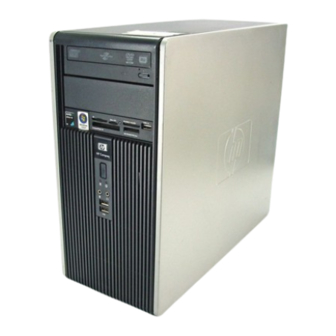
Compaq dc5850 - Microtower PC Manual
Computer setup (f10) utility guide
Hide thumbs
Also See for dc5850 - Microtower PC:
- Technical reference manual (114 pages) ,
- Troubleshooting manual (69 pages) ,
- Hardware reference manual (58 pages)
Table of Contents
Advertisement
Quick Links
Advertisement
Table of Contents

Summary of Contents for Compaq dc5850 - Microtower PC
- Page 1 Computer Setup (F10) Utility Guide - dc5850 Models HP Compaq Business PC...
- Page 2 No part of this document may be photocopied, reproduced, or translated to another language without the prior written consent of Hewlett-Packard Company. Computer Setup (F10) Utility Guide HP Compaq Business PC First Edition (January 2008) Document Part Number: 460192-001...
-
Page 3: About This Book
About This Book This guide provides instructions on how to use Computer Setup. This tool is used to reconfigure and modify computer default settings when new hardware is installed and for maintenance purposes. WARNING! Text set off in this manner indicates that failure to follow directions could result in bodily harm or loss of life. - Page 4 About This Book ENWW...
-
Page 5: Table Of Contents
Table of contents Computer Setup (F10) Utility Computer Setup (F10) Utilities ......................1 Using Computer Setup (F10) Utilities .................. 2 Computer Setup—File ......................3 Computer Setup—Storage ....................4 Computer Setup—Security ....................7 Computer Setup—Power ....................10 Computer Setup—Advanced ..................... 11 Recovering the Configuration Settings .................... - Page 6 ENWW...
-
Page 7: Computer Setup (F10) Utility
Computer Setup (F10) Utility Computer Setup (F10) Utilities Use Computer Setup (F10) Utility to do the following: ● Change system default settings. ● Set the system date and time. ● Set, view, change, or verify the system configuration, including settings for processor, graphics, memory, audio, storage, communications, and input devices. -
Page 8: Using Computer Setup (F10) Utilities
● Solve system configuration errors detected but not automatically fixed during the Power-On Self- Test (POST). ● Replicate the system setup by saving system configuration information on diskette and restoring it on one or more computers. ● Execute self-tests on a specified ATA hard drive (when supported by drive). ●... -
Page 9: Computer Setup-File
Computer Setup—File NOTE: Support for specific Computer Setup options may vary depending on the hardware configuration. Table 2 Computer Setup—File Option Description System Information Lists: ● Product name ● SKU number (some models) ● Processor type/speed/stepping ● Cache size (L1/L2) (dual core processors have this listed twice) ●... -
Page 10: Computer Setup-Storage
Computer Setup—Storage NOTE: Support for specific Computer Setup options may vary depending on the hardware configuration. Table 3 Computer Setup—Storage Option Description Device Configuration Lists all installed BIOS-controlled storage devices. When a device is selected, detailed information and options are displayed. The following options may be presented. - Page 11 Table 3 Computer Setup—Storage (continued) Allows you to specify the parameters (logical cylinders, heads, and sectors per track) used by the BIOS to translate disk I/O requests (from the operating system or an application) into terms the hard drive can accept. Logical cylinders may not exceed 1024. The number of heads may not exceed 256.
- Page 12 Table 3 Computer Setup—Storage (continued) bootable devices is displayed. Use the arrow keys to select the preferred bootable device and press Enter. The computer then boots from the selected non-default device for this one time. Computer Setup (F10) Utility ENWW...
-
Page 13: Computer Setup-Security
Computer Setup—Security NOTE: Support for specific Computer Setup options may vary depending on the hardware configuration. Table 4 Computer Setup—Security Option Description Setup Password Allows you to set and enable setup (administrator) password. NOTE: If the setup password is set, it is required to change Computer Setup options, flash the ROM, and make changes to certain plug and play settings under Windows. - Page 14 Table 4 Computer Setup—Security (continued) Network Service Boot Enables/disables the computer’s ability to boot from an operating system installed on a network server. (Feature available on NIC models only; the network controller must be either a PCI expansion card or embedded on the system board.) System IDs Allows you to set: ●...
- Page 15 Table 4 Computer Setup—Security (continued) Smart Card BIOS Password Support (some models) (enable/disable) Allows the user to enable/ disable the Smart Card to be used in place of the Setup and Power-On Passwords. This setting requires additional initialization within ProtectTools® before this option will take effect. Setup Security Level Provides a method to allow end-users limited access to change specified setup options, without having to know the Setup Password.
-
Page 16: Computer Setup-Power
Computer Setup—Power NOTE: Support for specific Computer Setup options may vary depending on the hardware configuration. Table 5 Computer Setup—Power Option Description ● OS Power ACPI S3 Hard Disk Reset—Enabling this causes the BIOS to ensure hard disks are ready to Management accept commands after resuming from S3 before returning control to the operating system. -
Page 17: Computer Setup-Advanced
Computer Setup—Advanced NOTE: Support for specific Computer Setup options may vary depending on the hardware configuration. Table 6 Computer Setup—Advanced (for advanced users) Option Heading Power-On Options Allows you to set: ● POST mode (QuickBoot, FullBoot, or FullBoot every 1–30 days). ●... - Page 18 Table 6 Computer Setup—Advanced (for advanced users) (continued) Execute Memory Test Restarts the computer and executes the POST memory test. (some models) BIOS Power-On Allows you to set the computer to turn on automatically at a time you specify. Onboard Devices Allows you to set resources for or disable onboard system devices (diskette controller, serial port, or parallel port).
-
Page 19: Recovering The Configuration Settings
Table 6 Computer Setup—Advanced (for advanced users) (continued) download a corporate image to a hard drive. The NIC option ROM takes up memory space below 1MB commonly referred to as DOS Compatibility Hole (DCH) space. This space is limited. This F10 option will allow users to disable the downloading of this embedded NIC option ROM thus giving more DCH space for additional PCI cards which may need option ROM space.














